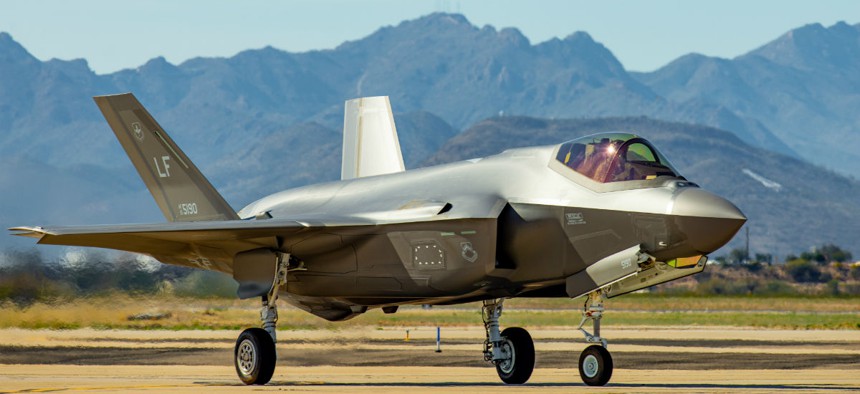China’s Cyber Prowess is Shaping How the Pentagon Buys

The F-35 demo team flew several sorties alongside Heritage Flight aircraft in preparation for the 2019 air show season. Jensen Stidham/Air Force
It's imperative for security to coincide with modernization, a Defense Department acquisition official said.
China’s drastic expansion of military and technological capabilities over the last 15 years has America’s procurement leaders focusing on the cybersecurity of what they buy.
“Over the last roughly full decade to 15 years, [China has gone] from being a very minor military player to a major military player with over 300 ships,” Deputy Under Secretary for Acquisition and Sustainment Alan Shaffer told the American Council for Technology and Industry Advisory Council’s Acquisition Excellence Conference Tuesday.
He said China was the second nation to field fifth-generation fighter aircraft, it has an extensive missile system, and it “actively uses cyber capabilities to ‘borrow’ other people’s intellectual property.”
Shaffer shared the Defense Department’s priorities for the coming year, including driving F-35 Joint Strike Fighter costs down, modernizing nuclear deterrents as well as nuclear command and control systems, providing real-time responses to combatant commanders and improving supply chain operations, among others.
But as the Defense Department makes considerations around buying things going forward, he said it’s imperative to think about cybersecurity and the capabilities that come from non-conventional weapon systems.
“We know for a fact that China uses cyberspace effectively to mine information,” Shaffer said. Shortly after, he added, “and we know that companies like Huawei are tied into Chinese intelligence services.”
Shaffer said he is concerned that the Chinese tech giant, Huawei Technologies Co., is moving very quickly in developing 5G networks and he warned against an Huawei-built 5G infrastructure being built in the U.S., Canada, or abroad. He said with the right software in place, communications sent over 5G networks can be sent back to network owners, which can lead to serious security vulnerabilities.
“I am not saying there are backdoors in Huawei’s 5G networks, but since it’s a software-enabled network and we know how some nations operate, we need to think very seriously about what we are buying and what our friends and allies are buying,” Shaffer said.
He also highlighted the Trump administration’s latest warning to Germany that the U.S. will pull back on intelligence sharing, if the European country allows Huawei to build its 5G Network infrastructure.
"We have to know the pedigree and surety of the underlying technology that we put into our systems,” Shaffer said. "That’s an important part of acquisition within the Department of Defense.”






